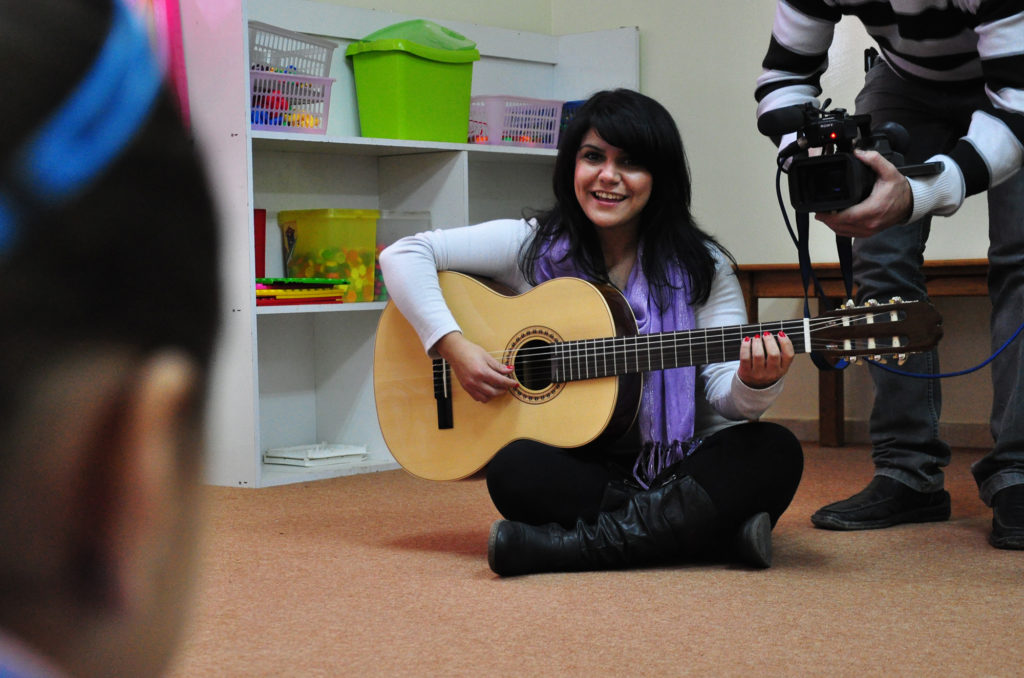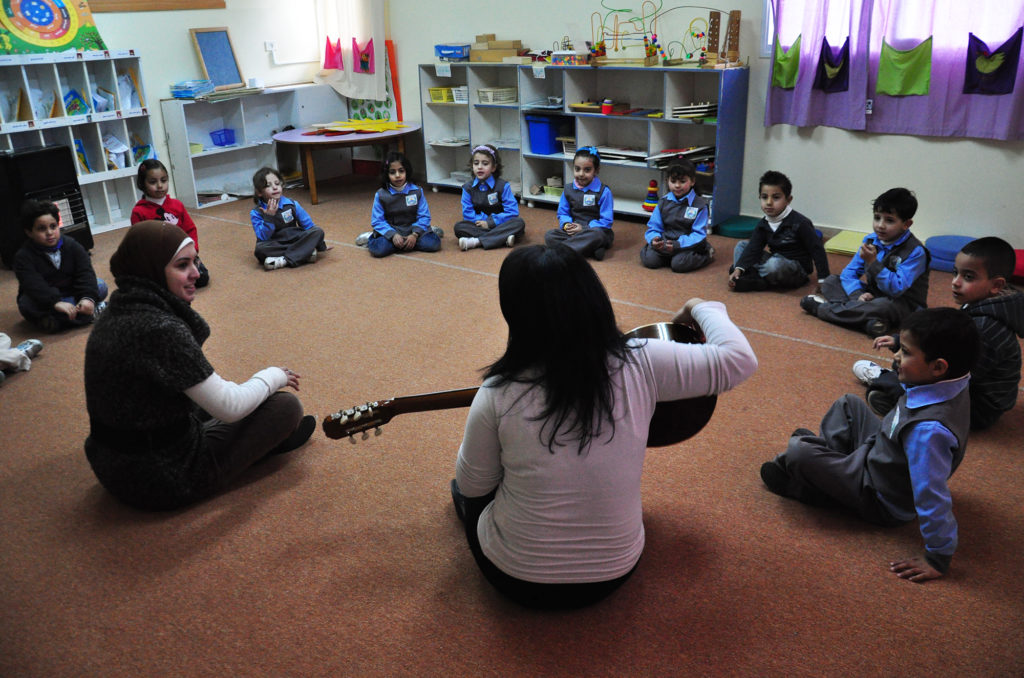How Music Therapy Helps Palestinian Children
Posted in: Voices from the field
By Buran Saada, Anera teacher trainer and music therapist
When I was only a school girl, I discovered my voice. My music teacher noticed that I could adapt to different music styles, so she picked me to sing in the school choir. In high school, I joined a band called Al-Awda, meaning “the return,” alluding to Palestinians’ long-awaited return to their homeland.

My ultimate dream was to become a solo artist, but my parents objected. They are quite conventional and traditional, like many people of their generation. To them, singing was fine as a hobby only. They appreciated music and supported my singing, but they didn’t like the idea of singing as a career. They wanted me to graduate with a degree in something safe and familiar, like engineering or accounting. But I wanted to study musicology and music education. You could say it was a challenge for me to defy their views and pursue music as a major. It turned out that being the youngest of seven children was an advantage in persuading my parents. Perhaps they would not have been as lenient had it been an older sibling.
Prior to university, I had mainly relied on my sense of rhythm and some basic training. I didn’t know how to play any instruments. Studying music helped refine my voice and give me a strong background in music as an art. When my parents saw me on stage for the first time, and when the news of my early accomplishments reverberated, they started to come around and change their minds.
My very first job was teaching music at a few schools in Jerusalem. Being a music teacher and being a music therapist are two different things, as the first focuses on academic achievement and conveying educational and social concepts, while the second entails a deeply sensory and emotional perspective.
How I Found My Passion


Teacher training is also a part of Buran’s work. Here, she shows preschool teachers how to use music instruments in the classroom.
Now I collaborate with Anera as a teacher trainer. My job is to help switch on a lightbulb in my students’ heads. Every person I help does the same for me. They compel me to explore how much I understand myself, and how much development I still need.
Through music therapy, I’ve helped people in and around Ramallah with special needs, emotional and psychological disorders, as well as neurodevelopmental disorders like autism or genetic disorders like Down’s syndrome. Music therapy is an alternative treatment that involves communicating through improvisation on musical instruments, singing and listening.
I work with children and teenagers, women and others who come to us with a lot of baggage and stress.
Music therapy is an alternative treatment that involves communicating through musical instruments, singing and listening.
I can’t describe how proud it makes me feel to help others, and how proud I am of my patients who choose to change and develop. I’ve seen kids overcome traumas and teenagers find their way after feeling lost. They make that switch in their lives. I only help them see their own capabilities and offer support.
Anybody can be their own therapist, and maybe that is why each of us has a favorite kind of music. Music can be calming or provoking or motivating. Some music provides a type of emotional and psychological relief, while we find other types that add to our stress.
How Music Helps Palestinian Children


Palestinian music therapist Buran works with preschool children across the West Bank.
Palestinian society is deprived in many areas, especially when it comes to education. Lack of resources, opportunity and poor economic conditions are quite restricting. This profound lack, especially in preschools, has hampered teachers’ creativity in building a healthy environment for children.
But even with limited resources, a lot can be done to accomplish educational and developmental goals. That’s something I try to make teachers understand. Even when it comes to regular musical activities, I try to give them a different perspective and teach them how one activity can be implemented in different ways to get different results. All they need is motivation.
Teaching is not just a task that teachers merely perform. They work with evolving characters, dynamics and communities. You can’t go by the book, because every individual and situation is unique. Teachers should approach the classroom with creativity, imagination and an open mind.
A Singer in the Making


Buran plays a number of instruments, which she uses in her music therapy session with Palestinian preschoolers in the West Bank.
I’m originally from Mi’ar, a Palestinian village on the outskirts of Acre, which was displaced in 1948. As a result, I was born and raised in Shaab, a village right next door. Mi’ar means a great deal to me, and it’s a force that drives my singing career. I like singing nationalistic songs, and also old Egyptian and Iraqi music.
Though I spend a lot of time working with teachers and my music therapy patients, I still make time to develop my career as a singer. I express myself through the music I create. With singing, I’m doing what I love and creating the music that I love listening to. I choose what to sing and in turn, my audience can choose to listen to me or not. Their encouragement and presence give me the energy and power to continue.
On stage, I’m always thirsty for this reciprocal energy. I try to give it back to the people I help through my work, people who are in need of it. I see my work and music career as a circle that completes itself. I try to create this circle in the people I train. I fill their needs and gaps, and through that I empower them to help others who desperately need it. This energy that passes from one person to another keeps growing.
Music is powerful. It’s a soul. It moves from one body to another, and one form to another. Just try and put on some music in a stagnant room and feel how it immediately comes to life. It does something that other mediums can’t do.
[Music] does something that other mediums can’t do.
OUR BLOG
Related
Joint Statement 200+ NGOs call for immediate action to end the deadly Israeli distribution scheme (including the so-called Gaza Humanitarian Foundation) in Gaza, revert to the existing UN-led coordination mechanisms, and lift the Israeli government’s blockade on aid and commercial…
